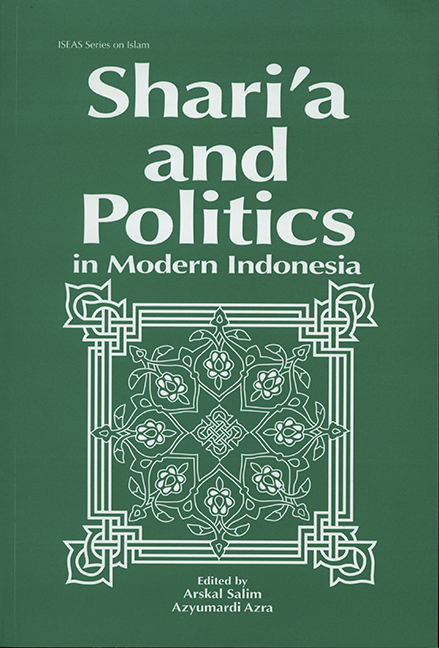Book contents
- Frontmatter
- Contents
- Acknowledgments
- List of Contributors
- Glossary
- 1 INTRODUCTION: The State and Shari'a in the Perspective of Indonesian Legal Politics
- 2 LAW AND POLITICS IN POST-INDEPENDENCE INDONESIA:A Case Study of Religious and Adat Courts
- 3 THE STATE AND SHARI'A IN INDONESIA
- 4 THE STATE'S LEGAL POLICY AND THE DEVELOPMENT OF ISLAMIC LAW IN INDONESIA'S NEW ORDER
- 5 THE INDONESIAN MARRIAGE LAW OF 1974: An Institutionalization of the Shari'a for Social Changes
- 6 INDONESIA'S 1989 RELIGIOUS JUDICATURE ACT: Islamization of Indonesia or Indonesianization of Islam?
- 7 THE POLITICAL BACKDROP OF THE ENACTMENT OF THE COMPILATION OF ISLAMIC LAWS IN INDONESIA
- 8 ISLAMIZING CAPITALISM: On the Founding of Indonesia's First Islamic Bank
- 9 FATWA AND POLITICS IN INDONESIA
- 10 ZAKAT ADMINISTRATION IN POLITICS OF INDONESIAN NEW ORDER
- 11 ISLAMIC VALUES, LAW AND EXPECTATIONS IN CONTEMPORARY INDONESIA
- 12 EPILOGUE: Shari'a in Indonesia's Current Transition: An Update
- APPENDICES
- Bibliography
- Index
12 - EPILOGUE: Shari'a in Indonesia's Current Transition: An Update
Published online by Cambridge University Press: 21 October 2015
- Frontmatter
- Contents
- Acknowledgments
- List of Contributors
- Glossary
- 1 INTRODUCTION: The State and Shari'a in the Perspective of Indonesian Legal Politics
- 2 LAW AND POLITICS IN POST-INDEPENDENCE INDONESIA:A Case Study of Religious and Adat Courts
- 3 THE STATE AND SHARI'A IN INDONESIA
- 4 THE STATE'S LEGAL POLICY AND THE DEVELOPMENT OF ISLAMIC LAW IN INDONESIA'S NEW ORDER
- 5 THE INDONESIAN MARRIAGE LAW OF 1974: An Institutionalization of the Shari'a for Social Changes
- 6 INDONESIA'S 1989 RELIGIOUS JUDICATURE ACT: Islamization of Indonesia or Indonesianization of Islam?
- 7 THE POLITICAL BACKDROP OF THE ENACTMENT OF THE COMPILATION OF ISLAMIC LAWS IN INDONESIA
- 8 ISLAMIZING CAPITALISM: On the Founding of Indonesia's First Islamic Bank
- 9 FATWA AND POLITICS IN INDONESIA
- 10 ZAKAT ADMINISTRATION IN POLITICS OF INDONESIAN NEW ORDER
- 11 ISLAMIC VALUES, LAW AND EXPECTATIONS IN CONTEMPORARY INDONESIA
- 12 EPILOGUE: Shari'a in Indonesia's Current Transition: An Update
- APPENDICES
- Bibliography
- Index
Summary
The collapse of the New Order regime in May 1998 has ushered in some new hopes for the application of shari'a (Islamic law) in Indonesia. Numerous Muslim groups and Indonesian figures consider this a golden opportunity to struggle for a fuller incorporation of shari'a into Indonesian legal systems. These aspirations are actually gaining in significance because, with the political liberalization in the wake of Soeharto's fall, each individual or group is free to express their goals and interests. In addition, the political shift from an authoritarian to a more democratic order, including some amendments to the 1945 Constitution (Undang-undang Dasar, or UUD 1945), has given the Indonesian people a fresh beginning for rebuilding the nation and consolidating upon existing legal systems. Triggered by demands for legal reform, the place of Islamic law and its institutional presence in Indonesia constitute an important issue. Now that Indonesia is undergoing a transition, there have been numerous interesting developments in the application of Islamic law in Indonesia.
Since most of the preceding chapters in this book were written during the New Order period, there is no analysis of the latest developments regarding shari'a in Indonesia, particularly during the terms of both President Habibie (May 1998– October 1999) and President Abdurrahman Wahid (October 1999–July 2001). Thus, this closing chapter will attempt to bring the book up to date. A number of remarks will also be made concerning some points made in previous chapters. It will be argued that political change in the post-New Order period has offered an opportunity for incorporating more shari'a elements into Indonesian legislation and has opened the gate for increasing demands for the local application of shari'a in certain regions in the country.
This chapter begins with a discussion of Indonesia's political transition, during which the political and social make-up of religious institutions has been realigned structurally. As the Supreme Court (Mahkamah Agung, or MA), the House of Representatives (DPR), and the Indonesian Bank (BI) have become more independent bodies, certain Islamic institutions such as the Islamic court and the Islamic Bank have also gained a more advantageous position and an increased capacity.
- Type
- Chapter
- Information
- Shari'a and Politics in Modern Indonesia , pp. 213 - 232Publisher: ISEAS–Yusof Ishak InstitutePrint publication year: 2003



